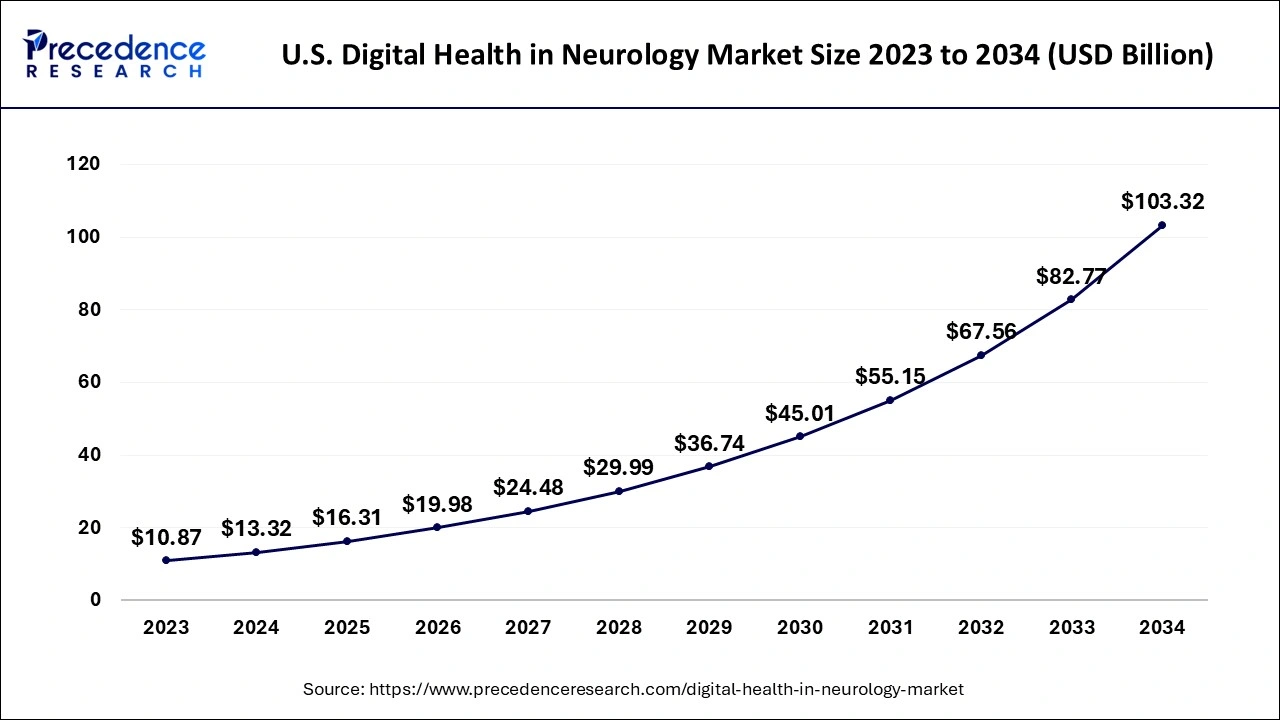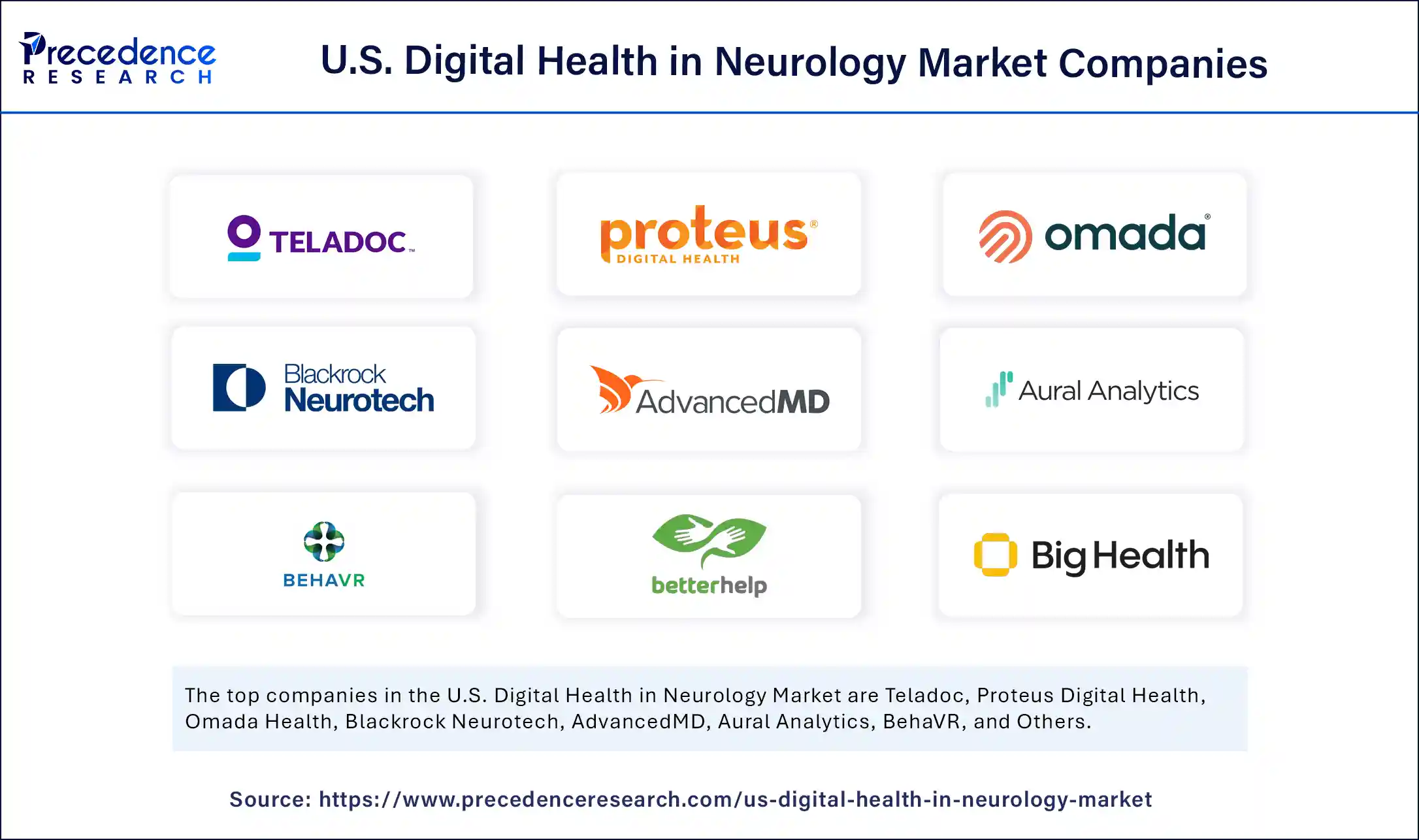The U.S. digital health in neurology market is welcoming a new era of growth, set to soar from USD 16.31 billion in 2025 to USD 103.32 billion by 2034, at a compelling CAGR of 22.73%. This striking trajectory is propelled by increased prevalence of neurological disorders, rapid advances in artificial intelligence (AI)–powered diagnostics, and the explosion in telehealth infrastructure across the nation. As the healthcare landscape shifts towards patient-centric, digitally enabled models, innovators and investors alike are primed for opportunity in one of the decade’s key life sciences frontiers.

Quick Insights: U.S. Digital Health in Neurology (2025–2034)
-
Market Value, 2025: USD 16.31 Billion
-
Market Value, 2034: USD 103.32 Billion
-
CAGR (2025–2034): 22.73%
-
Top Drivers: AI adoption, telehealth expansion, aging population, and rising chronic neurological conditions
-
Dominant Segment: Services for installation, support, and training
-
Fastest-Growing Segment: Software (AI tools, mobile health apps)
-
Largest End-User: Patients (driven by remote and self-managed care)
-
Leading Players: Medtronic, Abbott, Biogen, BehaVR, Teladoc, AppliedVR, BetterHelp
-
Key Regulatory Shift: FDA’s increased clearance of AI-enabled diagnostic and therapeutic devices
Get a Sample: https://www.precedenceresearch.com/sample/6704
Revenue Growth Table
| Metric | Value |
|---|---|
| Market Size in 2024 | USD 13.32 Billion |
| Market Size in 2025 | USD 16.31 Billion |
| Projected Market Size (2034) | USD 103.32 Billion |
| CAGR (2025–2034) | 22.73% |
What Is Shaping the Future?
Will AI, Wearables, and Telehealth Redefine U.S. Neurological Care?
AI is fundamentally altering the diagnostic paradigm in neurology, enabling advanced pattern recognition in brain imaging and patient data that exceeds human accuracy in conditions such as Parkinson’s, Alzheimer’s, stroke, and brain tumors. AI-enhanced systems assist clinicians by providing earlier and more precise detection, personalized treatment planning, and real-time remote monitoring using digital biomarkers.
Telehealth and remote patient monitoring (RPM) platforms offer critical links for chronic neurological conditions, supporting both urban convenience and the needs of rural America. Patients can now access specialist care, receive timely interventions, and better manage chronic diseases from the comfort of their homes, reducing readmissions and healthcare costs.
Expert Perspective
“The confluence of advanced AI, virtual care, and consumer-grade wearables is poised to revolutionize neurological care in the United States. These technologies drive earlier diagnoses, more personalized treatments, and accessible patient support, presenting real ROI for health systems and payers. With regulatory acceptance gaining ground, innovators have room to leap forward in therapeutic outcomes and patient experience.”
— Dr. Samantha North, Principal Digital Health Consultant, Precedence Research
Regional & Segment Analysis
A Patient-Centric Surge
-
Services Segment: Dominates due to continual demand for installation, maintenance, training, and support across digital health solutions like electronic health records and telehealth platforms. Providers are actively bundling comprehensive service offerings for seamless integration and clinician support.
-
Software Segment: Witnesses the fastest growth—with clinicians, payers, and patients adopting cloud-based platforms, digitalized medical records, and mobile apps for tracking neurological status and delivering real-time interventions. AI-enabled tools are in high demand for decision support and advanced data management.
-
Patients Segment: Leads end-use due to shifting preferences toward remote consultations, symptom monitoring, and health tracking through wearables (Samsung Galaxy Watch, etc.). This not only empowers self-management but supports timely interventions, enhancing quality of life for millions with chronic neurological issues.
-
Providers Segment: Growing fastest by embracing digital therapeutics, remote consultations, and continuous monitoring capabilities to improve efficiency and unlock cost savings. Software integration enables proactive management of degenerative diseases like Alzheimer’s and Parkinson’s.
Latest Breakthroughs from Leading Companies
-
Medtronic & Abbott: Developing next-gen wearable sensors and digital therapeutic applications for continuous monitoring and earlier detection of neurological events.
-
Biogen & BehaVR: Advancing digital health clinical trials and technology-assisted rehabilitation through VR and tailored software, focused on enhancing patient adherence and engagement, particularly in chronic neurological rehabilitation.
-
Teladoc, AppliedVR, and BetterHelp: Pioneering patient support platforms and mental health solutions that bridge the gap between home and clinic, expanding mental healthcare accessibility and engagement through immersive technologies.
Challenges and Cost Pressures
-
Regulatory Complexity: Evolving FDA pathways for digital health technologies—especially those harnessing AI/ML—introduce compliance costs and uncertainties that disproportionately impact smaller players and slow innovation pipelines.
-
Market Entry Barriers: High costs in validation, regulatory navigation, and data interoperability limit swift adoption, demanding robust partnerships, and coordinated advocacy for streamlined U.S. frameworks.
-
Healthcare Workforce Integration: Transitioning to fully digital workflows requires extensive training, change management, and ongoing technical support to maximize ROI on digital investments.
Case Study: Remote Monitoring for Stroke Prevention
A leading hospital system in the Midwest adopted an AI-driven telehealth platform for real-time monitoring of high-risk patients with a history of minor strokes. The deployment reduced hospital readmissions by over 30%, cut ER visits, and improved medication adherence rates. Patients reported higher satisfaction from managing recovery at home, while clinicians accessed actionable data streams to deliver timely intervention—underscoring how digital neurology improves outcomes on both sides of the care equation.
U.S. Digital Health in Neurology Market Companies

- Teladoc
- Proteus Digital Health
- Omada Health
- Blackrock Neurotech
- AdvancedMD
- Aural Analytics
- BehaVR
- BetterHelp
- Big Health
- AppliedVR
For inquiries, sample downloads, or bespoke consultation, contact: sales@precedenceresearch.com.